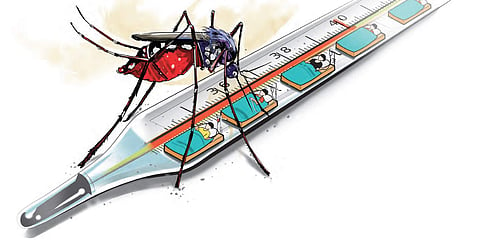

BHUBANESWAR: After impressive gains in malaria reduction in 2018, an alarming rise in cases of the vector borne disease and delay in supply of long-lasting insecticidal nets (LLIN) has put the Odisha government in a tight spot.
As per the National Centre for Vector Borne Diseases Control, malaria cases in the state doubled during January-May as compared to the corresponding period last year. The state had recorded 3,345 cases and zero deaths during the five-month period in 2022. However, this year, the cases went up to 6,709 with one death in the same period. Odisha contributed around 22 per cent of the country’s malaria tally and was second among states recording high malaria cases after Chhattisgarh.
What has emerged a concern is that six districts - Malkangiri, Koraput, Rayagada, Kalahandi, Boudh and Kandhamal are among the nine where the targeted interventions were made - have recorded more cases. Though the annual parasite index (API) that had gone up from 0.88 in 2019 to 0.92 in 2020 has come down to 0.52 in 2022, the API has shot up to five in Malkangiri and more than one in three other districts.
While heat wave conditions and dropping of guard by people using LLINs are attributed to the rise in cases, health experts working in malaria prone areas said the nets need to be replaced as those were procured in 2019. LLINs are much more effective than untreated mosquito nets because they are treated with a WHO-recommended insecticide. The insecticide effect lasts up to three years or 20 washes. As many as 1.16 crore nets were distributed in the state and if these nets are not replaced, malaria cases will rise further, they warned.
Health officials, however, blamed the residents in the high-burden districts for not using the LLINs properly. “We have reports from different parts of the state that people in some cases did not use the nets at all citing sweltering weather conditions. Despite awareness drives, they continue to sleep in the open without nets all along the summer,” said an official.
Director of public health Dr Niranjan Mishra said the LLINs distributed in the state are still effective as per the ICMR’s Vector Control Research Centre (VCRC) and the cases will remain in control if people use it properly.
“Though the cases went up due to the rise in the number of tests, hospitalisation was less. The death rate has also dropped compared to previous years as we have been following a protocol of early detection and complete treatment. The control mechanism is functioning. Besides, we have directed the districts to focus on source reduction and increase awareness,” he added.
Meanwhile, the state government has requested the Ministry of Health to supply 1.56 crore fresh LLINs to replace the old nets. But despite reminders, the Centre is yet to respond. In 2018, the state had recorded 84 per cent reduction in malaria cases. Health secretary Shalini Pandit said, “We have requested the MoHFW to procure and supply mosquito nets. Their confirmation is awaited.”